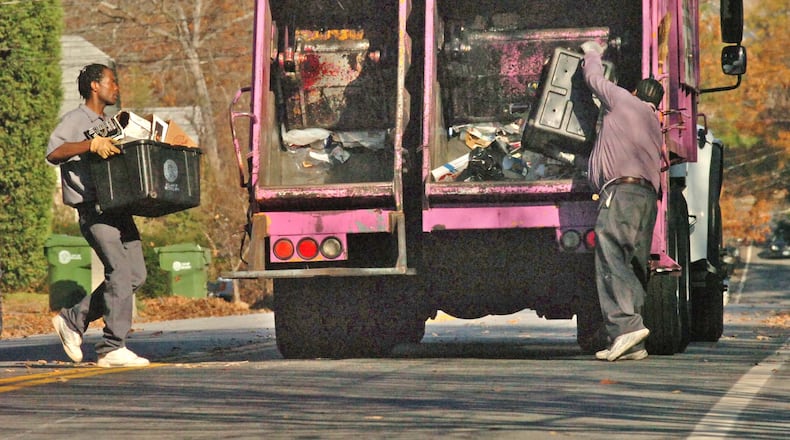Innovations in mobile phone technology will soon help the city of Atlanta better track residential recycling habits in an effort to reduce landfill waste.
In January, city garbage collectors will begin carrying phones with specially designed software that links to trucks so the city can monitor what Atlantans are recycling and how much they are diverting from the dump.
The link between software on the truck and the phones will allow the city to record such data collected as what neighborhoods are best at recycling based on the frequency of stops while garbage collectors can type into the phone issues they may encounter, such as bins with non-recyclable items like building materials, hangers or toys.
“This will help us with our outreach campaign to educate the public on the importance of recycling,” said Michelle Wiseman, director of waste diversion and outreach for the city’s office of sustainability. “We’ll see who’s recycling and who’s recycling right.”
Recycling is big business in Georgia. Some of the state's biggest industries — including paper, aluminum and carpet manufacturers — rely heavily on recyclables for their products, experts said. The state is only second to California in the manufacturing use of recycled materials, Wiseman said.
“We’re putting money in the landfill,” she said.
Atlanta's efforts also come as one of the mainstays of recycling — glass containers — increasingly is ending up in landfills instead of being recyled. Recycling companies are turning away glass because its market value has fallen compared to other materials such as cardboard and plastic and because glass can cripple machinery that recycles multiple refuse. Counties such as DeKalb have sought to separate glass by setting up drop off points so it can be more easily recycled.
About 96,000 single family homes in Atlanta have recycling containers, Wiseman said. The city picks up trash three times a week — once for general refuse, once for recyclables and once for yard waste.
The city has partnered in the effort with Atlanta-based waste and recycling firm Rubicon Global, which is donating its expertise and software in a six-month pilot, the first municipal contract for the company.
Michael Allegretti, Rubicon’s head of public policy, said drivers of about 75 or so Atlanta garbage trucks will use the mobile phones during their routes. The phones will record everything from which homes consistently recycle to the weight of the materials being recycled to the total size of the truck’s load at the end of each route.
Drivers also can enter information about a particular address, such as if the container is overflowing, damaged or knocked over, Allegretti said. The city can then talk to the homeowner about any problems encountered and how to remedy them.
“The city can see what’s going on in real time,” Allegretti said, including whether trucks need maintenance or if routes are problemtic because of traffic or other obstacles. “This is a smart city solution.”
About the Author
Keep Reading
The Latest
Featured



